Blogs
LVF, LVT, LVP, EVP or SPC Flooring: What’s The Difference?
In the current plethora of hard flooring solutions, vinyl has witnessed a remarkable resurgence.
Its ability to tolerate damp conditions makes it a versatile choice throughout the home, while its resistance to temperature fluctuations enables it to be installed over underfloor heating.
Add its appealing price point into the mix, and it becomes clear why vinyl is ascending in popularity.
Customers often encounter various vinyl flooring variations labelled with acronyms like LVF, LVT, LVP, EVP, SPC, leading to some confusion.
This guide will dissect each variant, enabling you to select the most suitable flooring for your project.
Spc flooring – Stone Plastic Composite Flooring
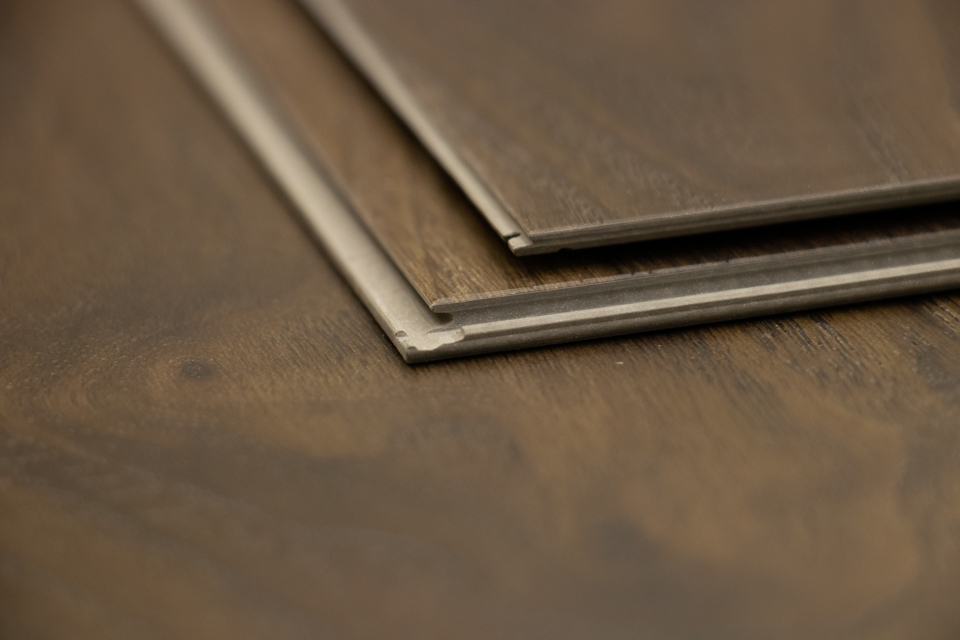
SPC Core: Stone Plastic Composite
We initiate our discussion with Spc flooring, although technically, SPC isn’t a flooring.
Stone Plastic Composite (SPC) refers to the core material employed in LVT, LVF, LVP, and EVP flooring. Alternatives to an SPC core include PVC, WPC, and Rigid core.
The true value of Spc flooring lies in its impressive strength and longevity. Resistant to scratches, dents, and stains, Spc flooring withstands daily wear with ease.
Owing to its solid nature, SPC can feel rather firm underfoot, thus using an underlay is advisable. SPC vinyl flooring with integrated underlay is also available.
LVF Flooring – Luxury Vinyl Flooring
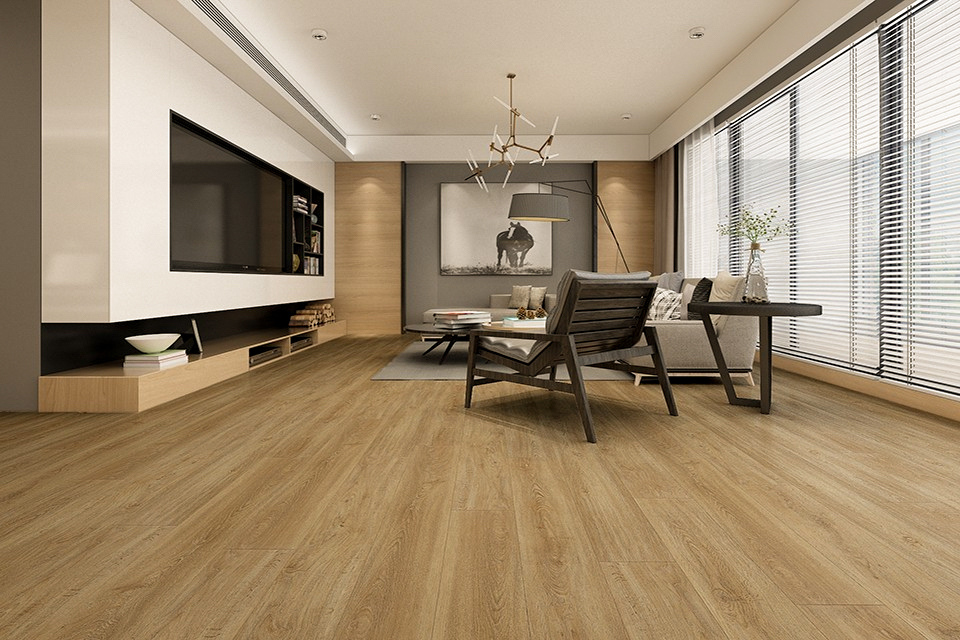
LVF: Luxury Vinyl Flooring Consisting of LVT, LVP and EVP Flooring Styles
Luxury Vinyl Flooring (LVF) is an umbrella term encompassing a range of hard vinyl flooring styles, including LVT, LVP, and EVP.
Following the above explanation, LVF consists of LVT, LVP, and EVP flooring types that incorporate an SPC core.
This synthetic flooring solution emulates the look of natural wood (in the case of LVP and EVP) or mirrors the aesthetics of genuine stone or marble (for LVT).
LVT Flooring – Luxury Vinyl Tile Flooring
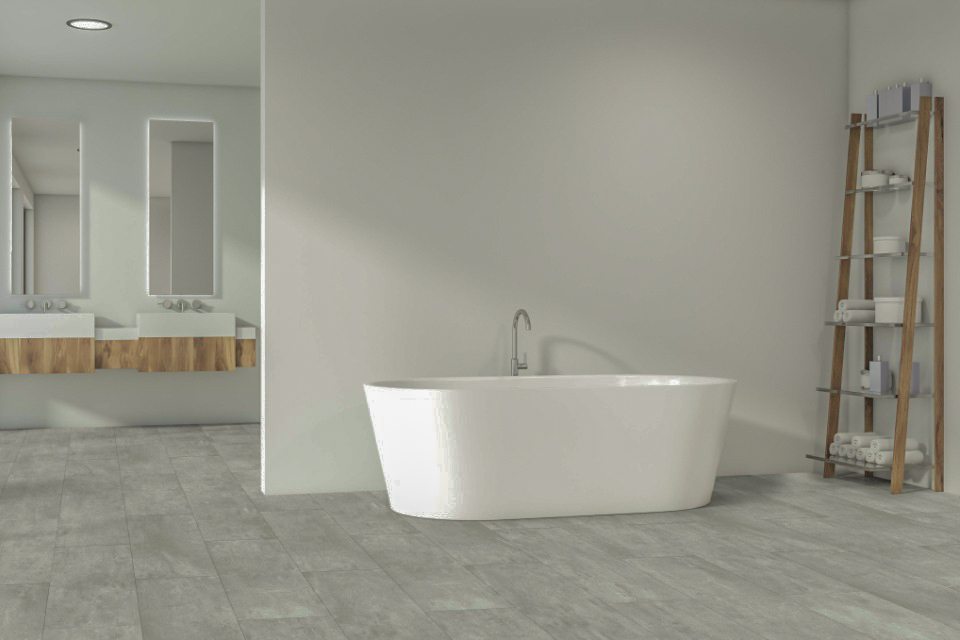
LVT: Luxury Vinyl Tile Flooring, Made to Look Like Stone or Marble Flooring in Tile Shape
Luxury Vinyl Tile (LVT) is a subset of luxury vinyl flooring, comprising styles that resemble actual stone or marble tiles.
Unlike genuine stone or marble flooring, LVT feels more comfortable underfoot, can be installed anywhere, and doesn’t carry a steep price tag.
Once installed, the tiles appear so authentic that distinguishing them from real stone or marble becomes a challenge.
LVP – Luxury Vinyl Plank Flooring
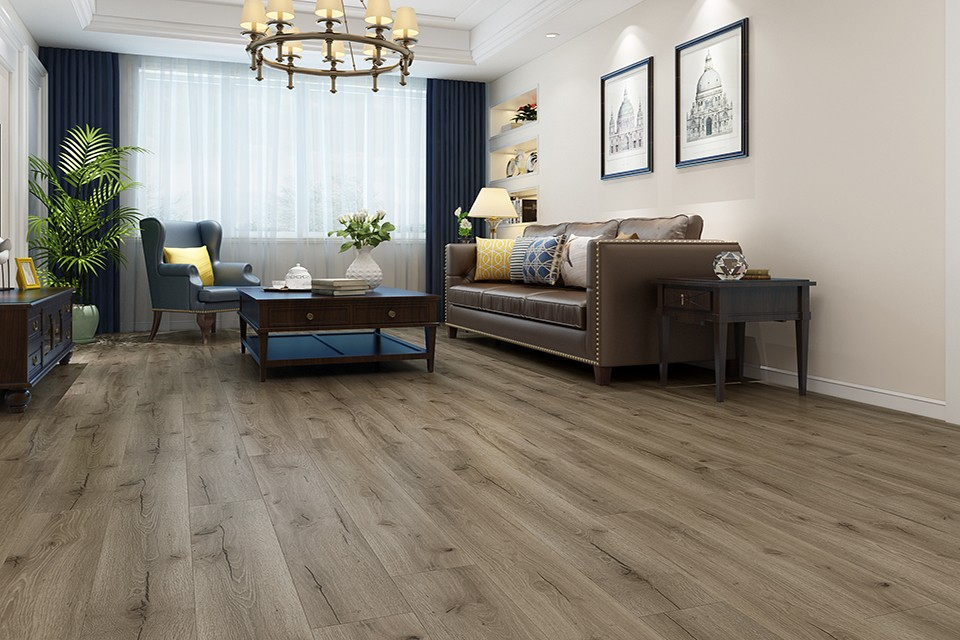
LVP: Luxury Vinyl Plank Flooring, Made to Look Like Natural Wood in Plank Style
Luxury Vinyl Plank (LVP) flooring parallels LVT in many ways, but instead of emulating tiles, it imitates the look of natural wooden planks.
If you aspire to infuse your space with a flexible flooring solution that emulates the look of solid or engineered wood flooring, LVP will not disappoint.
Its detailed design layer faithfully reproduces patterns of natural wood.
EVP – Engineered Vinyl Plank Flooring
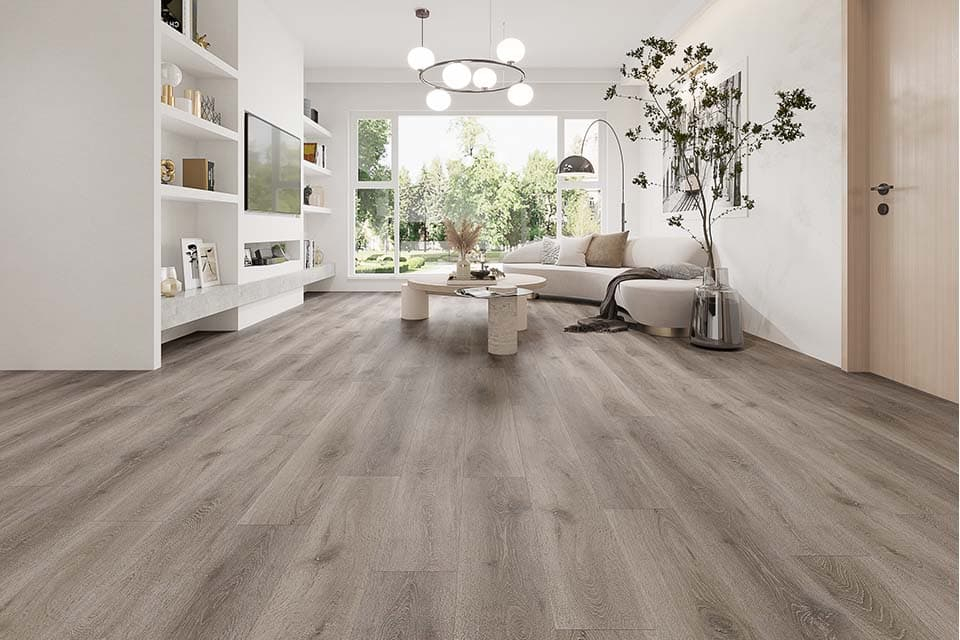
EVP: Engineered Vinyl Plank Flooring, a Synonym for LVP Flooring
Engineered Vinyl Plank (EVP) flooring is essentially a synonym for LVP flooring.
Known for its ability to mimic the appearance of natural woods like Oak and Walnut, EVP offers a sophisticated, modern flooring solution with enhanced durability and minimal maintenance requirements.
LVF, LVT, LVP, EVP Structure
LVT, LVP, and EVP flooring types, all different styles of LVF flooring, share a common structure:
Resilient Vinyl Backing: This foundational layer provides stability and strength to the product. It forms the base layer for other layers and is crucial for the overall dimensional stability of the luxury vinyl floorboard.
Vinyl Core Layer: Sitting atop the backing layer, this layer imparts depth and resilience to the product. This core not only enhances underfoot comfort but also contributes to the noise reduction properties of the floor. Options include SPC, PVC, WPC, and Rigid core.
Photographic Print Layer: This layer houses the high-definition 3D imaging, giving the floor its lifelike appearance. It can convincingly mimic a variety of materials such as wood (LVP and EVP), stone, or ceramic tile (LVT), down to the grain, texture, and tonal variations of the original material.
Wear Layer: This topmost layer protects the floor from wear and tear, scratches, and stains. Often composed of clear urethane or polyurethane, it can be fortified with additives like ceramic bead, silica bead, or aluminium oxide for heightened durability. The wear layer varies in thickness based on the intended usage, from a thinner layer for low-traffic areas (0.3mm, for instance) to a thicker layer for high-traffic commercial applications (0.7mm, for instance).
Conclusion
LVT, LVP, and EVP fall under the broader category of LVF (Luxury Vinyl Flooring) and can be equipped with an SPC core.
The distinctions between these vinyl flooring solutions hinge on style (tile versus plank) and aesthetic appeal (stone versus wood).
—
FAQ
What is Spc flooring?
Stone Plastic Composite (SPC) isn’t technically a flooring but the core material used in LVT, LVF, LVP, and EVP flooring. It stands out due to its impressive strength and durability, easily resisting scratches, dents, and stains. Given its solid nature, it may feel firm underfoot, hence using an underlay is advisable.
How does LVF differ from LVT, LVP, and EVP flooring?
Luxury Vinyl Flooring (LVF) is a general term that encompasses a range of hard vinyl flooring styles, including LVT, LVP, and EVP. All these types incorporate an PVC, WPC, Rigid or SPC core. LVF emulates the appearance of natural wood (in the case of LVP and EVP) or real stone or marble (for LVT).
What makes LVT flooring unique?
Luxury Vinyl Tile (LVT) flooring is a type of luxury vinyl flooring that resembles actual stone or marble tiles. Despite its authentic appearance, LVT offers more comfort underfoot, broader installation options, and affordability compared to genuine stone or marble flooring.
What is the composition of LVT, LVP, and EVP flooring?
LVT, LVP, and EVP flooring types share a common four-layered structure:
Resilient Vinyl Backing: The foundational layer providing stability and strength.
Vinyl Core Layer: Sits above the backing layer, imparting depth and resilience.
Photographic Print Layer: Houses the 3D imaging that gives the floor its lifelike appearance.
Wear Layer: The topmost protective layer.
How does the wear layer contribute to the durability of vinyl flooring?
The wear layer protects the vinyl flooring from wear and tear, scratches, and stains. It’s often composed of clear urethane or polyurethane and can be fortified with additives for enhanced durability. Its thickness varies based on the intended usage, ranging from a thinner layer for low-traffic areas to a thicker one for high-traffic commercial applications.
RELATED NEWS
- How to Choose a Reliable SPC Flooring Factory 2025-10-13
- SPC Flooring vs Laminate Flooring 2025-07-30
- SPC vs LVT Flooring 2025-06-24
- What makes SPC Rigid Core Flooring is smart choice 2025-01-08
- Spc Vinyl Floor Samples feedback from USA customers 2024-11-13
CATEGORIES
LATEST NEWS
CONTACT US
Contact: Senoinfi Flooring
Phone: 8617763599241
E-mail: senoinfi@yeah.net
Add: Industry Park, Developmzne Zone,Liaocheng City,Shandong Province,China
